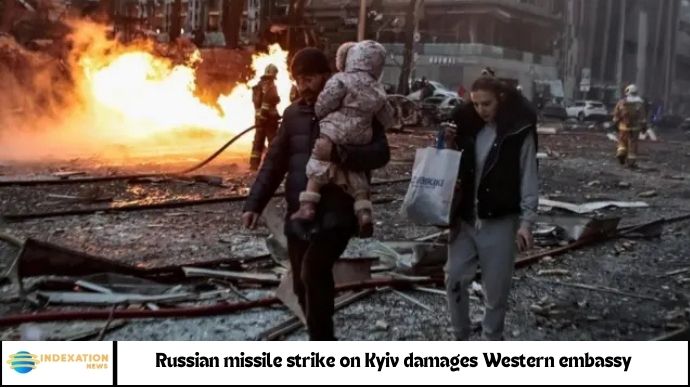Russian Missile Strike on Kyiv Damages Western Embassy At least one person was killed and several NATO embassies were damaged in a Russian missile strike on central Kyiv on Friday. This marked a significant escalation as the Kremlin targeted what it referred to as Ukrainian “decision-making centres.”
Ukraine reported that debris from five intercepted Iskander ballistic missiles hit the city center just before sunrise, causing extensive damage to numerous buildings. While Russia’s defense ministry claimed to have struck an intelligence command center, Ukraine said the attack caused significant damage to a historic cathedral, a university, high-rise office buildings, and six foreign embassies.
Kyiv officials confirmed that the attack resulted in the death of a 53-year-old man and injured 12 others, with five requiring hospitalization, most of them suffering from shrapnel wounds.
Margarita Simonyan, editor-in-chief of the state-owned Russian broadcaster RT, remarked, “Now the attacks on the notorious decision-making centres have arrived.
The Russian Ministry of Defence stated, “The objectives of the strike have been achieved. All targets have been hit,” describing the attack as retaliation for Ukraine’s recent strike on Russia’s Rostov region using Western-supplied missiles.
According to RIA Novosti, a Russian state news agency, citing an alleged pro-Russian “underground” coordinator, the missile strike early Friday morning reportedly killed several senior Ukrainian intelligence officers.
Moscow’s defence ministry also claimed to have targeted an office linked to a weapons developer involved in missile production.
Images from the scene revealed extensive damage to the roofs of two high-rise buildings near St. Nicholas Cathedral, which was also reportedly damaged in the strike.
Russian Missile Strike on Kyiv: What Happened?
On January 21, 2025, Kyiv, the capital of Ukraine, faced a deadly missile strike believed to have been launched by Russian forces. The target: a Western embassy located in the heart of the city. While the identity of the embassy has not been officially confirmed, reports indicate that the attack caused extensive damage to the embassy’s facilities, including shattered windows, structural damage, and fires within the building.
Details of the Attack
- Location: The missile hit Kyiv’s central district, home to several foreign diplomatic missions.
- Casualties: Several embassy staff members were injured in the attack, though initial reports suggest no fatalities.
- Immediate Impact: The embassy’s compound was severely damaged, with important diplomatic documents and equipment destroyed in the blast.
- Security Breach: The strike raises concerns about the vulnerability of foreign embassies in Kyiv, which had previously been considered a relatively secure area despite the ongoing conflict.
What This Means for Diplomacy and Global Relations
The missile strike on a Western embassy in Kyiv has profound implications for global diplomacy:
- Diplomatic Fallout: The attack has strained relations between Russia and Western nations, leading to calls for stronger sanctions and accountability.
- Embassy Security: This incident underscores the vulnerability of diplomatic missions in conflict zones. Many countries will likely review and increase security measures for their embassies worldwide.
- International Response: Western leaders are condemning the strike, with some pledging increased support for Ukraine, while others are calling for immediate discussions on the future of diplomatic immunity in war zones.
The Ongoing Conflict and Global Security Concerns
This missile strike is just the latest in a series of escalations in the ongoing Russia-Ukraine conflict. With tensions high and no clear end in sight, the international community is deeply concerned about the safety of both Ukrainian civilians and foreign diplomats. The strike serves as a reminder of the unpredictable and dangerous nature of the conflict, which continues to have ripple effects on international security.
Global Reactions and Future Outlook
The international response to the missile attack on the embassy has been swift:
- UN Involvement: The United Nations Security Council is expected to convene an emergency meeting to address the breach of international law and discuss sanctions against Russia.
- Western Nations Responding: Countries like the United States, the UK, and several European nations have pledged additional military and humanitarian aid to Ukraine in light of the attack.
- Further Escalation: Many experts fear that this attack may be a precursor to further escalation in Kyiv, as Russia seeks to demonstrate its power and further destabilize Ukraine’s capital.
Frequently Asked Questions (FAQ)
Why did Russia target the Western embassy in Kyiv?
The exact motives behind the attack are unclear, but it is believed to be part of Russia’s broader strategy to intimidate foreign diplomatic missions and assert power in Ukraine.
What damage was done to the embassy?
The embassy’s buildings suffered structural damage, with windows shattered and some fires ignited. Several staff members were injured in the attack.
Was anyone killed in the missile strike?
No fatalities have been confirmed, but several embassy staff members sustained injuries, some seriously.
How are other countries reacting to the attack?
Western nations are strongly condemning the attack, with some pledging to strengthen security measures for their diplomatic missions in conflict zones.
What is the potential diplomatic fallout from this incident?
The strike could lead to further deterioration of diplomatic relations between Russia and Western countries, with calls for increased sanctions.
What does this mean for embassies in conflict zones?
The attack raises concerns about the safety of diplomatic missions in war zones, prompting countries to review and potentially increase security protocols for embassies.
Conclusion:
The Russian missile strike on a Western embassy in Kyiv is a stark reminder of the escalating tensions in Ukraine and the vulnerabilities faced by diplomatic missions in conflict zones. As the international community responds, it’s clear that this attack will have lasting consequences on diplomatic relations, security measures, and the future of international diplomacy in volatile regions.

